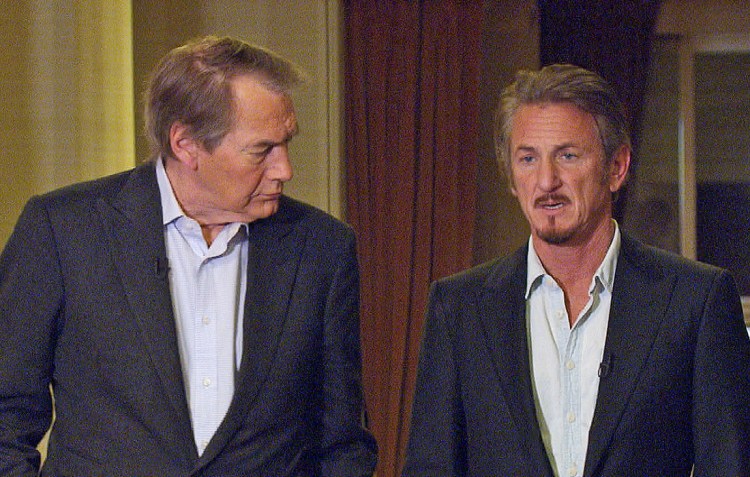Sean Penn believes his controversial interview with Mexican drug lord Joaquín “El Chapo” Guzmán was a failure. Not because it scarcely addressed the horrific violence caused by Guzmán’s cartel. Not because he gave Guzmán control over the story. Not because of any of the heaps of criticism leveraged at the actor in the days since his interview with Guzmán was released in Rolling Stone.
Penn believes he failed because his story didn’t start a conversation about the war on drugs.
“And how much time have they spent in the last week since this article come out, talking about that?” Penn said on “60 Minutes” Sunday. “One percent? I think that’d be generous.”
Penn gave an interview to CBS’s Charlie Rose to further explain how he came to interview Guzmán, one of the most wanted criminals on Earth. Guzmán escaped from a Mexican maximum-security prison in July and was on the run before being recaptured this month. Penn, with the help of actress Kate del Castillo, was invited to meet with Guzman in October. The resulting article, which CBS aptly described as “sometimes rambling, often gripping,” was printed in Rolling Stone on Jan. 10, after the approval of Guzmán himself.
“What was brokered for me to have the interview with El Chapo was that I would finish the article, send it to him, and if he said no, then that was no harm, no foul to any reader,” Penn said.
For journalists, this agreement, cited in an editor’s note, was the most shocking detail of the entire story. It is almost unheard of to allow a source to read a story before it is printed, let alone give that source the control to stop the story. Penn dismissed these concerns, saying he is “really sad about the state of journalism in our country,” calling it “an incredible hypocrisy.”
“Journalists who want to say that I’m not a journalist,” Penn said. “Well, I want to see the license that says that they’re a journalist.”
In a preview of the interview shared online Friday, CBS revealed that Penn claims his adventure did not in any way lead to Guzmán’s capture. This is in contrast to statements from Mexican government officials and interviews with residents near the location where Penn and Guzmán met.
Penn also denied that his story should have been less sympathetic to a man who is responsible for countless murders and endless criminal activity.
“I was not present to report on the things people would like to see reported on,” Penn responded. “I was not present at murders. I was not present to see narcotics. I was not present to that. What I was present for I wrote. I wrote that to use it as a pillar for an article about the policy of the war on drugs.”
“60 Minutes” confronted Penn with another widely mocked aspect of the story: Once again, it put Penn’s name in the headlines. The actor has a history of getting involved in heated political situations, including traveling to Iraq and Iran. He also aided rescue efforts after the earthquake in Haiti and Hurricane Katrina in New Orleans. Rose addressed the issue in the interview.
Rose: What about those who say, “This is his ego. He likes being in the center of this. He’s an adventurer. He thinks of himself as a writer in the tradition of Hunter Thompson with a kind of experiential quality to him.” You accept any of that?
Penn: Do I accept that people feel that way?
Rose: Yeah.
Penn: I absolutely accept that they feel that way.
Rose: And are they right?
Penn: No, they’re not right.
Send questions/comments to the editors.



Success. Please wait for the page to reload. If the page does not reload within 5 seconds, please refresh the page.
Enter your email and password to access comments.
Hi, to comment on stories you must . This profile is in addition to your subscription and website login.
Already have a commenting profile? .
Invalid username/password.
Please check your email to confirm and complete your registration.
Only subscribers are eligible to post comments. Please subscribe or login first for digital access. Here’s why.
Use the form below to reset your password. When you've submitted your account email, we will send an email with a reset code.